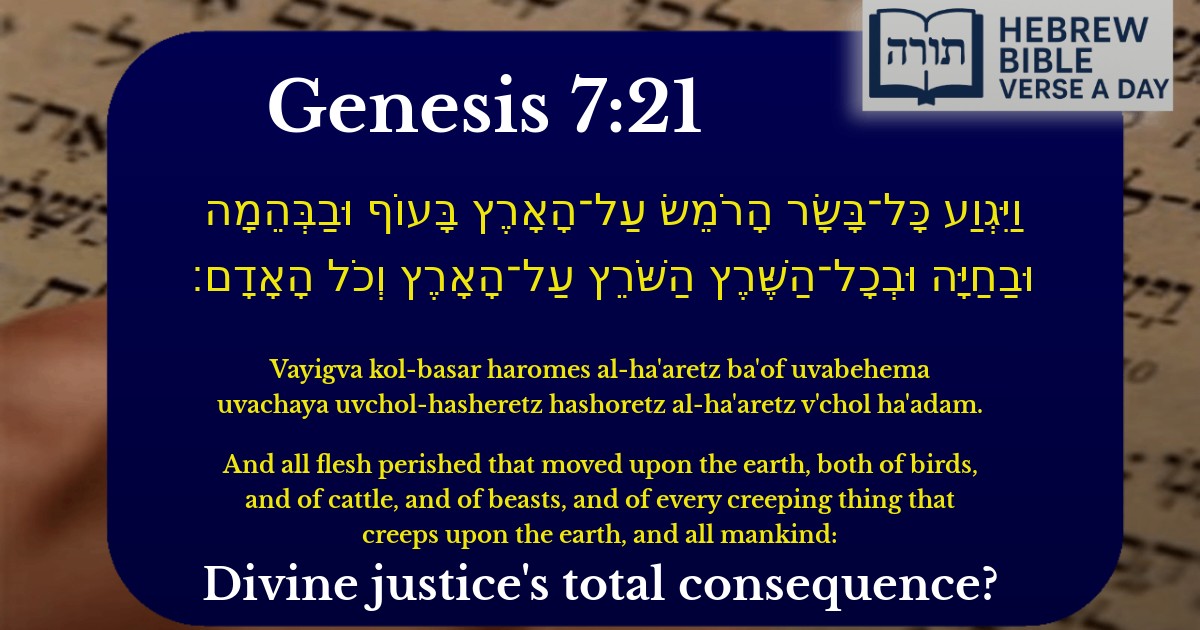Frequently Asked Questions
Q: What does Genesis 7:21 mean?
A: Genesis 7:21 describes the complete destruction of all living creatures during the flood in the time of Noah. According to Rashi, this verse emphasizes that the flood was a divine punishment that affected every living being on land—birds, animals, creeping creatures, and humans—because of the corruption that had spread in the world (Genesis 6:11-13). Only those in Noah's ark were spared.
Q: Why is Genesis 7:21 important?
A: This verse is important because it highlights the severity of divine justice when moral corruption becomes widespread. The Rambam (Maimonides) teaches in 'Hilchot Teshuva' that this event serves as a lesson about the consequences of unchecked evil and the importance of repentance (teshuvah) to avoid catastrophe.
Q: What can we learn from Genesis 7:21 today?
A: We learn that ethical behavior and righteousness are essential to sustaining life. The Midrash (Genesis Rabbah 31:6) explains that the flood came because of theft and injustice. Today, this teaches us the importance of justice, kindness, and following G-d's commandments to maintain a moral society.
Q: Why were animals also punished in the flood?
A: According to the Talmud (Sanhedrin 108a), the animals were included in the punishment because they too had become corrupted—some even engaged in unnatural behavior. Rashi adds that since humans influenced the animals negatively, they shared in the consequences. This teaches that human actions impact all of creation.
Q: How does Genesis 7:21 relate to the concept of divine mercy?
A: While this verse describes strict judgment, the Torah also shows divine mercy by saving Noah and his family. The Midrash (Pirkei D’Rabbi Eliezer 23) teaches that G-d delayed the flood to give people time to repent. This balance of justice and mercy is a recurring theme in Jewish thought.


The Extent of the Mabul (Flood)
The verse (Bereishit 7:21) describes the comprehensive destruction during the Mabul, emphasizing that all living creatures on land perished. Rashi explains that the term "וַיִּגְוַע" (perished) implies a gradual expiration of life, as opposed to sudden death, indicating Hashem's mercy even in judgment. The inclusion of all categories—birds, cattle, beasts, creeping things, and mankind—demonstrates the totality of the decree.
Why Were the Animals Punished?
The Midrash (Bereishit Rabbah 28:8) questions why animals were included in the punishment when only humanity had sinned. It explains that the animals had also become corrupted, engaging in unnatural behavior (as hinted in Bereishit 6:12, "כי השחית כל בשר"). Rambam (Moreh Nevuchim 3:17) adds that the animals' destruction was a necessary consequence of the ecosystem's collapse due to human corruption.
The Order of the Creatures
Lessons from the Verse
The Talmud (Sanhedrin 108a) derives that the generation of the Flood was eradicated only after their sins reached an irreversible state. This teaches the principle of middah k'neged middah (measure for measure): just as they corrupted their ways, their physical existence was undone. The Netziv (Ha'amek Davar) notes that the phrase "כל הָאדָם" (all mankind) underscores the universality of the judgment, leaving no exceptions beyond Noach's family.